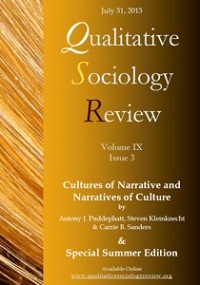Telling the Collective Story: Symbolic Interactionism in Narrative Research
DOI:
https://doi.org/10.18778/1733-8077.9.3.03Keywords:
Narrative Research, Symbolic Interaction, Sensitizing Concepts, Widowhood, Bahá’í, Marginalized PopulationsAbstract
Recent years have seen tremendous growth of interest in narrative approaches to research in both the social sciences and the humanities. Much of this research focuses on the stories of individuals and how they tell them. This article addresses the contribution of a symbolic interactionist approach to develop the “collective story” (Richardson 1990) through the use of sensitizing concepts. It focuses on research on the experience of widows, widowers, and Iranian Bahá’í refugees to Canada to demonstrate how one can use sensitizing concepts to craft a collective story of members of marginalized populations that sit at the bottom of the “hierarchy of credibility” (Becker 1967).
Downloads
References
Aylyn, Ayalah. 2010. Resurrection Ferns: Resiliency, Art, and Meaning Constructs Among Survivors of Trauma or Difficult Life Events. PhD dissertation, University of Alberta.
Google Scholar
Bayley, John. 2001. Widower’s House: A Study in Bereavement or How Margo and Mella Forced me to Flee My Home. New York: W. W. Norton & Company.
Google Scholar
Becker, Howard. 1967. “Whose Side are We on?” Social Problems 14(3):239-247.
Google Scholar
DOI: https://doi.org/10.2307/799147
Charmaz, Kathy. 1991. Good Days, Bad Days: the Self in Chronic Illness and Time. New Brunswick, NJ: Rutgers University Press.
Google Scholar
Coates, Jennifer. 2003. Men talk. Stories in the making of masculinities. Oxford: Blackwell Publishing.
Google Scholar
Dohaney, Myrtis. 1989. When Things Get Back to Normal. Porters Lake, NS: Pottersfield Press.
Google Scholar
Ekerdt, David. 1986. “The Busy Ethic: Moral Continuity Between Work and Retirement.” Gerontologist 26(3):239-244.
Google Scholar
DOI: https://doi.org/10.1093/geront/26.3.239
Hochschild, Arlie. 1979. “Emotion Work, Feeling Rules, and Social Structure.” American Journal of Sociology 85(3):551-575.
Google Scholar
DOI: https://doi.org/10.1086/227049
Holstein, James A. and Jaber F. Gubrium. 1995. The Active Interview. Thousand Oaks, CA: Sage.
Google Scholar
DOI: https://doi.org/10.4135/9781412986120
Kenyon, Gary, Ernst Bohlmeijer, and William L. Randall. 2011. Storying Later Life: Issues, Investigations, and Interventions in Narrative Gerontology. New York: Oxford University Press.
Google Scholar
Kenyon, Gary and William L. Randall. 1997. Restorying Our Lives: Personal Growth through Autobiographical Reflection. Westport, CN: Praeger.
Google Scholar
Kingston, Anne. 2007. “The Sexiest Man Alive.” Maclean’s, November 22.
Google Scholar
Kirsi, Tapio, Antti Hervonen, and Marja Jylhä. 2000. “A Man’s Gotta Do What a Man’s Gotta Do: Husbands as Caregivers to their Demented Wives, A Discourse Analysis.” Journal of Aging Studies 14(2):153-169.
Google Scholar
DOI: https://doi.org/10.1016/S0890-4065(00)80009-2
Lopata, Helena Z. 1973. Widowhood in an American City. Cambridge, MA: Schenkman.
Google Scholar
Lopata, Helena Z. 1979. Women as Widows: Support Systems. New York: Elsevier.
Google Scholar
Marcus, Ivan G. 2004. The Jewish Life Cycle: Rites of Passage from Biblical to Modern Times. Seattle: University of Washington Press.
Google Scholar
Middleton, Valerie A., Sharon K. Anderson, and James H. Banning. 2009. “The Journey to Understanding Privilege: A Meta-Narrative Approach.” Journal of Transformative Education 7:294-311.
Google Scholar
DOI: https://doi.org/10.1177/1541344610386868
Moore, Alinde J. and Dorothy C. Stratton. 2002. Resilient Widowers: Older Men Speak for Themselves. New York: Springer.
Google Scholar
Pringle, Richard. 2008. “No Rugby, no fear: Collective stories, masculinities, and transformative possibilities in schools.” Sports, Education & Society 13(2):215-237.
Google Scholar
DOI: https://doi.org/10.1080/13573320801957103
Prus, Robert. (2005) “Studying Human Knowing and Acting: The Interactional Quest for Authenticity.” Pp. 7-13 in Doing Ethnography: Studying Everyday Life, edited by Dorothy Pawluch, William Shaffir, and Charlene Miall. Toronto: Canadian Scholars’ Press.
Google Scholar
Reissman, Catherine K. 1993. Narrative Analysis. Newbury Park, CA: Sage.
Google Scholar
Reissman, Catherine K. 2001. “Analysis of Personal Narratives.” Pp. 695-710 in Handbook of Interview Research: Context and Method, edited by Jaber F. Gubrium and James A. Holstein. Thousand Oaks, CA: Sage.
Google Scholar
Richardson, Laurel. 1988. “The Collective Story: Postmodernism and the writing of sociology.” Sociological Focus 21(3):199-208.
Google Scholar
DOI: https://doi.org/10.1080/00380237.1988.10570978
Richardson, Laurel. 1990. Writing Strategies: Reach Diverse Audiences. Newbury Park, CA: Sage.
Google Scholar
Richardson, Laurel. 2000. “The Metaphor is the Message: Commentary on Arthur Frank’s ‘Illness and the Interactionist Vocation’.” Symbolic Interaction 23(4):333-336.
Google Scholar
DOI: https://doi.org/10.1525/si.2000.23.4.333
van den Hoonaard, Deborah. K. 1997. “Identity Foreclosure: Women’s Experiences of Widowhood as Expressed in Autobiographical Accounts.” Ageing & Society 17:533-551.
Google Scholar
DOI: https://doi.org/10.1017/S0144686X97006582
van den Hoonaard, Deborah. K. 2001. The Widowed Self: The Older Woman’s Journey Through Widowhood. Waterloo, ON: Wilfrid Laurier University Press.
Google Scholar
van den Hoonaard, Deborah. K. 2009. “Widowers’ strategies of self-representation during research interviews: A sociological analysis.” Ageing & Society 29:257-276.
Google Scholar
DOI: https://doi.org/10.1017/S0144686X08007721
van den Hoonaard, Deborah. K. 2010. By Himself: The Older Man’s Experience of Widowhood. Toronto: University of Toronto Press.
Google Scholar
DOI: https://doi.org/10.3138/9781442686526
van den Hoonaard, Deborah. K. 2012. Qualitative Research in Action: A Canadian Primer. Toronto: Oxford University Press.
Google Scholar
van den Hoonaard, Deborah. K., Kate M. Bennett, and Elizabeth Evans. 2012. “I was there when she passed: older widowers’ narratives of the death of their wife.” Ageing & Society / FirstView Article:1-18. Retrieved June 20, 2013 http://www.liv.ac.uk/~kmb/MyPublishedPapers/vandenHoonaardBennettEvans2013.pdf
Google Scholar
van den Hoonaard, Will C. 1997. Working with Sensitizing Concepts: Analytical Field Research. Thousand Oaks, CA: Sage.
Google Scholar
van den Hoonaard, Will C. and Deborah. K. van den Hoonaard. 2007. “The Poignant Accomplishments of Bahá’í Newcomers from Iran.” Paper delivered at the New Brunswick and Atlantic Studies Research and Development Centre Conference: Town and Country: Exploring Urban and Rural Issues in New Brunswick. St. Thomas University, June 22-23, Fredericton, Canada.
Google Scholar
Downloads
Published
How to Cite
Issue
Section
License

This work is licensed under a Creative Commons Attribution-NonCommercial-NoDerivatives 4.0 International License.











